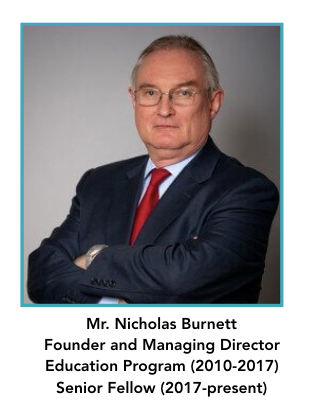
Photo Credit: Results for Development
Results for Development (R4D) is a non-profit organization dedicated to linking research to action in health, nutrition, and education. It was founded in 2008 by the former vice president of the World Bank, David De Ferranti. While conceptualizing R4D, De Ferranti talked to an old colleague and good friend, Nicholas Burnett. He wanted Burnett to lead the education chapter of R4D, but it wasn’t until 2010 that Burnett decided to join the organization and take De Ferranti up on his offer. This leadership profile gives an overview of how Mr. Burnett successfully founded and led the education area of R4D, which focuses on education financing, early childhood development, skills & employability, and out-of-school children.
When Mr. Burnett joined the organization in 2010, he was offered a six-month salary and was told that he would have to develop the education chapter from scratch. This gave him a lot of room for creativity but also a lot of responsibility. Before even starting to plan, he knew he would have to secure funding for the education sector. To do so, he initially relied on CEO De Ferranti to help make connections as well as leveraging his contacts to find funding opportunities that aligned with the work R4D was striving for. Within nine months, the education sector had secured enough funds to hire another person and they were able to decide the projects they wanted to undertake.
Mr. Burnett had to make difficult choices in the beginning and prioritize what projects were to get done and which would have to wait. In the beginning, he said there were five areas that he wanted to focus on: out of school children, innovation in education, education financing, systems level change, and the link between secondary school and employment. He chose these topics based off of two criteria which he had set for himself: 1.) The importance of the area in the present context, and 2.) Areas that were neglected or not handled properly. He wanted to choose topics of relevance where they could make a difference. In this way, Mr. Burnett was very methodological and intentional in prioritizing projects for the education sector.
In hiring his staff, he demonstrated the same characteristics. He not only chose people he felt would bring expertise but also work well as a team. His strategic use of interns as well as staff allowed for the education sector to grow while still securing funding. Nicholas approached hiring as a smart and driven individual who deeply understood the value of having the right, and bright, people who will help produce change.
Leadership Style
Mr. Burnett is truly a transformational leader, who intimately knows each staff member and intern who have worked under him. He puts an emphasis on building a team of young, passionate, and collaborative people who are committed to the mission of the organization. Since, most of the employees working for, and with him, were young, he would make sure that they were motivated and challenged in different ways. One way is through getting the employees into publishing research and presenting in international conferences that would help increase their personal visibility. Another way was by providing bonuses to show appreciation for their work, which he mentioned improved employee recognition within the organization. He would also make sure that his employees felt constantly challenged by giving them responsibilities slightly higher than what they think they could handle, just about to push them.
Mr. Burnett self identifies as a “pretty tough” leader but also believes in being “human” when it comes to leading people. He would always give his employees a chance to improve and support them in the process. His philosophy is based on fair leadership practices, not just for people who are part of R4D, but also for those who could not be part of it. He strongly believes that a lot of an institution’s reputation depends not on who you hire but on how you treat people whom you don’t hire. Hence, he encourages providing feedback to them so that they feel they were treated fairly, even though they were not provided with an offer. This explains how great of a leader Mr. Burnett is. Since he stepped in as education director at R4D, he has exemplified his passion for impacting education through his leadership style. Without the strength of his interpersonal skills, the organization might not have accomplished its important and viable goal of creating self-sustaining systems that support healthy, educated people around the world.


